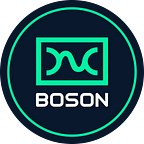NFTs with superpowers
Non-fungible tokens have rarely been out of the headlines this year. But there is a lot more to NFTs than art and collectibles…
Hardly a week has gone by in 2021 without the mainstream media hyping up yet another story about NFTs, whether it was Beeple’s record-breaking $69m sale at Christie’s or Twitter’s first tweet (by Jack Dorsey).
As mainstream artists and sports stars enter the burgeoning NFT space, it is worth remembering that non-fungible tokens have far greater capabilities than simply registering and transferring the ownership of art and collectibles.
While Boson Protocol is not a NFT minting platform, we do use NFTs as a core part of our core exchange mechanism allowing us to be a liquid decentralized exchange for anyThing.
With this in mind, we thought we’d take you on a brief look at how NFTs are able to offer this functionality — and how they originated.
While CounterParty, a protocol that allowed users to “write in the margins of Bitcoin”, enabled the creation of collectibles that were the first examples of NFT registration on a blockchain, it was not until the development of Ethereum that it became possible to write smart contracts that extended the functionality of NFTs.
Just as the contract that defines an ERC-20 token on Ethereum has to conform to certain coding rules and conventions, the ERC-721 standard was the first set of contract rules that defined how an NFT should behave. This was then extended further in the ERC-1155 standard contract, which allows creators to define different types of assets within the same smart contract.
This lesson in blockchain history is important in order to understand that these developments evolved NFT contracts to include many different types of specifications and conditions. They paved the way for NFTs that do far more interesting things than simply demonstrating ownership.
NFTs in the music industry
Kings of Leon fans who bought their album, When You See Yourself, could choose from three different types of NFTs. One represented an album package. Another gave special perks like concert tickets and the third included exclusive audiovisual art.
If we look at the second example — the promise of tickets in the future — we can see that in this case the NFT is behaving like a kind of futures contract. This kind of logic is easy to write into a smart contract, and we can expect to see many more of these contracts being created in the future.
Other musicians are also providing NFTs which represent experiences in both virtual and physical spaces. In his second foray into non-fungible tokens, Post Malone offered crypto art collectibles that were also encoded with the opportunity to participate in exclusive events. One of these included the chance to play beer pong with him.
Bridging the physical and digital realms is something that is also core to the functionality of Boson Protocol. We solve the problem of digital-to-physical redemption by issuing commitment tokens, which are NFTs backed with game theory, that enable the exchange of any item with minimized human arbitration, thus offering an automated, frictionless way for commerce to happen in a decentralized manner.
These Boson commitment tokens are also, effectively, a kind of futures contract for the thing they represent. One of the most exciting aspects of Boson Protocol is its ability to connect virtual spaces and the real world without participants needing to trust each other.
While Boson Protocol’s unique value proposition is to tokenize the exchange of assets, rather than tokenizing the assets themselves (a useful distinction), there are other cases where NFTs can confer benefits or ownership in the physical world. The use of NFTs in the automotive industry is a hot topic right now. Andreas Park from the University of Toronto suggests, for example, that fractional ownership in a self-driving car could be registered by using NFTs.
NFTs in DeFi and CeFi
NFTs that represent physical items in this way can also plug directly into the DeFi system and be used as collateral for loans, for example. Issuers could even specify in the original contract whether this was to be allowed.
And while their origins are firmly in the decentralized space, NFTs even have potential for centralized finance as well as DeFi.
In this interesting post, Marcel Wolff describes how non-fungible tokens could be used to represent bond covenants, bank loans or other types of complex unique securities such as structured notes. Wolff warns though against risks such as oracle failures, where facts that are supplied off-chain turn out to be incorrect, or smart contract contagion, bugs or inconsistencies in linked smart contracts, that could provoke cascade effects.
While the type of tokens our all-star team at Boson Protocol is developing are a world away from the type of smart contract that simply mints a meme and lists it for sale, the underlying technology is the same.
Whether an NFT contract is simple or complex, whether it is deployed to Ethereum or on one of the other rapidly developing networks, all share the same principles. This evolving area remains one of deep interest to developers, entrepreneurs and anyone interested in culture, society or the future of commerce.
About Boson Protocol
At Boson Protocol, we are creating a decentralized commerce ecosystem that everyone can use and anyone can trust.
Boson Protocol is a decentralized infrastructure for enabling autonomous commercial exchanges of anyThing, specifically off-chain items. Boson is a peer-to-peer system which replicates the benefits of a market intermediary, without the disbenefits of centralized systems.
Keen to learn more?
Enjoy the dCommerce Stack outlining the services we’ll need to build a dCommerce ecosystem.
In a hurry?
Check out how the protocol works here.
Want to get involved?
See our live job openings
Where are we going?
See our ROADMAP and embark with us.
Got more questions?
Our FAQs ought to have you covered.
Stay close: Telegram | Twitter | LinkedIn | Website | YouTube | Medium
